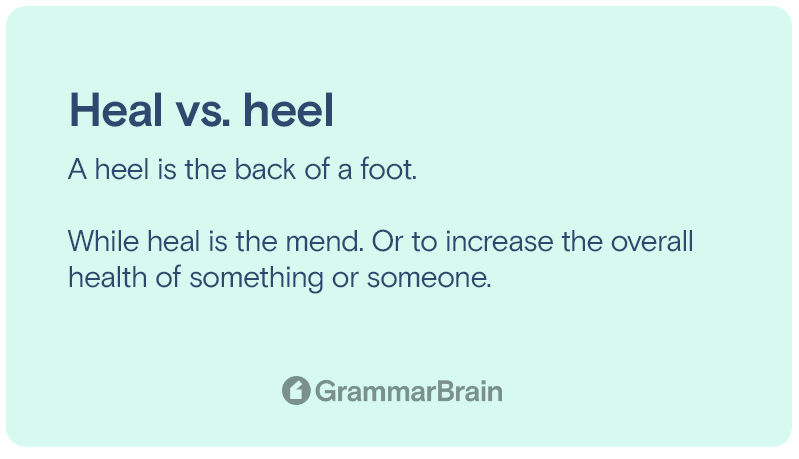Heel and heal are homophones, i.e., words that have the same phonic sound but are spelled differently. They are pronounced in the same way, but they carry different meanings. It can often be confusing to right, and incorrect usage might distract your audience and derail your academic and professional writing credibility.

Heal vs. Heel definition
By definition, “heal” is to repair or restore health. In contrast, the heel is the back part of the foot or a scoundrel. Kindly note that “heal” is a verb, while “heel” is a noun.
| Word | Definition |
| Heal (verb) | (of a person or treatment) cause (a wound, injury, or person) to become sound or healthy again. |
| Heel (noun) | the back part of the human foot below the ankle. |
Likewise, the verb “heal” is used when some action takes place. It essentially defines the process of repairing something which is broken. It can also be used in case of forgetting, forgiving, or passing over a moment/period of suffering or pain.
- As an example: I will let my back pain heal naturally because I do not want to take any pills.
- Another example: I try to practice yoga, meditate, walk and sleep to find inner peace and heal my soul.
When do we use “heel”?
“Heel’ is a noun, and it can define a body part as well, like the back part of the foot or that of a shoe.
- As an example: My shoes were uncomfortable, so my heels are hurting.
- Another example: I love wearing heels.
Meaning of Heel
The heel is a noun and represents the back part of the foot.
Noun: heel
- The bottom of a shoe or boot; is the back part of a shoe or boot that touches the ground and provides elevation.
- The back part of the human foot
- Someone who is morally reprehensible. For example, “You dirty heel; blackguard, bounder, cad, dog, hound”
- One of the crusty ends of a loaf of bread.
- The lower end of a ship’s mast
- (golf) the part of the clubhead where it joins the shaft
Verb: heel
- Put a new heel on. For example, Heel shoes = reheel
- Tilt to one side. For example, The balloon heeled over; the wind made the vessel heel = list
- Follow at the heels of a person
- (dance) perform with the heels. For example Heel, that dance
- (golf) strikes with the club’s heel. For example, “The heel of a golf ball”
Derived
- Noun: heeler
- Verb: Reheel
- Adjective: Heelless
Meaning of Heal
Heal possibly means repairing an injury. It can be transitive or intransitive. For example, I healed my scab with ointment.
Verb: heal
- Get healthy again. For example, “The wound is healing slowly = mend”
- (medicine) provide a cure for, and make healthy again. For example, “The quack pretended to heal patients but never managed to = bring around a cure”
- Reconcile or restore (a difference or breach in good relations)
Derived
- Noun: healer, healing
- Adjective: healable, healed
Conclusion
We use “heal” when we need to repair something broken. We use “heel” when we denote our foot or shoe. “Heels” is the plural form of the heel. It refers to elevated shoes to make the person look taller.
- Example: I have been wearing these heels all day. Now I wish to sit and have some food.
Alternatively, Heel has a secondary meaning to it. It means a nasty or annoying person. My neighbor is a heel of women. She yells at everyone. Sometimes “heel” can also be used as a verb. For example: when commanding an animal to follow its owner.
Inside this article
Fact checked:
Content is rigorously reviewed by a team of qualified and experienced fact checkers. Fact checkers review articles for factual accuracy, relevance, and timeliness. Learn more.
Core lessons
Glossary
- Abstract Noun
- Accusative Case
- Anecdote
- Antonym
- Active Sentence
- Adverb
- Adjective
- Allegory
- Alliteration
- Adjective Clause
- Adjective Phrase
- Ampersand
- Anastrophe
- Adverbial Clause
- Appositive Phrase
- Clause
- Compound Adjective
- Complex Sentence
- Compound Words
- Compound Predicate
- Common Noun
- Comparative Adjective
- Comparative and Superlative
- Compound Noun
- Compound Subject
- Compound Sentence
- Copular Verb
- Collective Noun
- Colloquialism
- Conciseness
- Consonance
- Conditional
- Concrete Noun
- Conjunction
- Conjugation
- Conditional Sentence
- Comma Splice
- Correlative Conjunction
- Coordinating Conjunction
- Coordinate Adjective
- Cumulative Adjective
- Dative Case
- Determiner
- Declarative Sentence
- Declarative Statement
- Direct Object Pronoun
- Direct Object
- Diction
- Diphthong
- Dangling Modifier
- Demonstrative Pronoun
- Demonstrative Adjective
- Direct Characterization
- Definite Article
- Doublespeak
- False Dilemma Fallacy
- Future Perfect Progressive
- Future Simple
- Future Perfect Continuous
- Future Perfect
- First Conditional
- Irregular Adjective
- Irregular Verb
- Imperative Sentence
- Indefinite Article
- Intransitive Verb
- Introductory Phrase
- Indefinite Pronoun
- Indirect Characterization
- Interrogative Sentence
- Intensive Pronoun
- Inanimate Object
- Indefinite Tense
- Infinitive Phrase
- Interjection
- Intensifier
- Infinitive
- Indicative Mood
- Participle
- Parallelism
- Prepositional Phrase
- Past Simple Tense
- Past Continuous Tense
- Past Perfect Tense
- Past Progressive Tense
- Present Simple Tense
- Present Perfect Tense
- Personal Pronoun
- Personification
- Persuasive Writing
- Parallel Structure
- Phrasal Verb
- Predicate Adjective
- Predicate Nominative
- Phonetic Language
- Plural Noun
- Punctuation
- Punctuation Marks
- Preposition
- Preposition of Place
- Parts of Speech
- Possessive Adjective
- Possessive Determiner
- Possessive Case
- Possessive Noun
- Proper Adjective
- Proper Noun
- Present Participle
- Prefix
- Predicate



